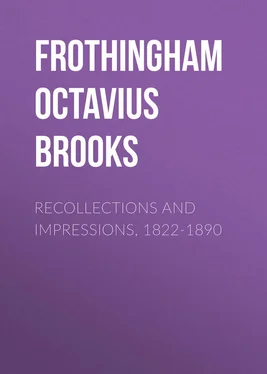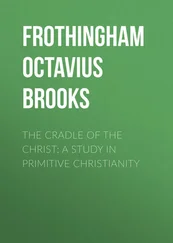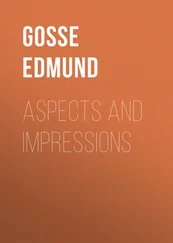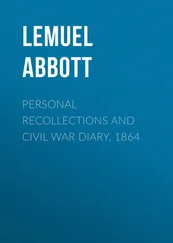Octavius Frothingham - Recollections and Impressions, 1822-1890
Здесь есть возможность читать онлайн «Octavius Frothingham - Recollections and Impressions, 1822-1890» — ознакомительный отрывок электронной книги совершенно бесплатно, а после прочтения отрывка купить полную версию. В некоторых случаях можно слушать аудио, скачать через торрент в формате fb2 и присутствует краткое содержание. Жанр: foreign_antique, foreign_prose, на английском языке. Описание произведения, (предисловие) а так же отзывы посетителей доступны на портале библиотеки ЛибКат.
- Название:Recollections and Impressions, 1822-1890
- Автор:
- Жанр:
- Год:неизвестен
- ISBN:нет данных
- Рейтинг книги:3 / 5. Голосов: 1
-
Избранное:Добавить в избранное
- Отзывы:
-
Ваша оценка:
- 60
- 1
- 2
- 3
- 4
- 5
Recollections and Impressions, 1822-1890: краткое содержание, описание и аннотация
Предлагаем к чтению аннотацию, описание, краткое содержание или предисловие (зависит от того, что написал сам автор книги «Recollections and Impressions, 1822-1890»). Если вы не нашли необходимую информацию о книге — напишите в комментариях, мы постараемся отыскать её.
Recollections and Impressions, 1822-1890 — читать онлайн ознакомительный отрывок
Ниже представлен текст книги, разбитый по страницам. Система сохранения места последней прочитанной страницы, позволяет с удобством читать онлайн бесплатно книгу «Recollections and Impressions, 1822-1890», без необходимости каждый раз заново искать на чём Вы остановились. Поставьте закладку, и сможете в любой момент перейти на страницу, на которой закончили чтение.
Интервал:
Закладка:
Of interest in the denomination, the sect, the party name, he was absolutely devoid. He never attended the conventions or conferences of the Unitarian body or spoke in their deliberations. On anniversary week it was for many years his custom to visit New York, where no professional responsibility rested upon him, and where he could find recreations of a purely social kind. But at the "Boston Association" where he met friends one by one, and could talk half confidentially, with perfect freedom, in a conversational tone, he delighted to be present.
For the rest, he was a man universally respected, admired, and beloved, mirthful and sportive, more than tolerant of gaiety, as a rule in excellent spirits, though subject, as such temperaments usually are, to moods of depression. Without private ambition and utterly destitute of vanity, his uneventful days were spent among his friends and his books. The round of clerical duties was even and monotonous; his calling had few excitements; even poverty had limits, and social iniquity was manageable in those times when relations were simple. The routine of parochial service was such as a friendly man of quick sympathies and ready speech could easily discharge in a few hours of each week, nor was the transition violent from it to the quiet library, the companionship of Cicero, Shakespeare, Milton, Walter Scott, Herder, Rückert. The love of art, society, literature, was not inconsistent with a love of the Saviour; and though as a matter of taste he would not have spoken of a sonata of Beethoven in a sermon, there was nothing in his philosophy to render secular allusions improper.
His literary predilections were somewhat at the mercy of his sense of beauty, as if he had an eye to artistic effect quite as much as to intellectual justice, as if the firm lines of logical discernment were blurred by the passion for poetic or scenic grace. Of the two famous German writers about whom opinions were divided, he greatly preferred Schiller to Goethe, probably because the former was glorious, ardent, declamatory. Of the two eminent English novelists whom all the world was reading, Dickens was his choice far above Thackeray, perhaps for the reason that Dickens had color and warmth of sentiment, while Thackeray seemed to him cold, skeptical, and cynical. The flow of eloquence, the charm of dramatic style made him relish authors as radically unlike as Carlyle, Ruskin, and Macaulay, rendering him unmindful of qualities in their cast of thought which he might have disapproved of if less seductively presented. When a lady objected to Macaulay on the score of his material ethics, Dr. Frothingham was too much captivated by Macaulay's manner to criticise his philosophy, and he let the philosophy go. It sometimes looked as if the way in which things were said was of more importance in his view than the things themselves; but it was not so, for he could respond to ideal sentiments when they offered themselves fairly to his mind, and his moral indignation against an act of flagrant turpitude was quick and hot.
With politics, whether speculative or practical, he gave himself small concern, for in his day politics were hardly an honorable calling. He belonged to the Whig party, as it was then called, because it comprised the greater number of educated men – scholars, divines, lawyers, physicians, judges, and people of consideration from their position in society. The Republican party in Massachusetts was not formed till his public life was nearly ended, and we may doubt whether he would in any case have connected himself with it, for its aims and purposes were hardly such as he could have gone along with. The well-known sentiment, ascribed to Wendell Phillips, "Peace if possible, Truth at any rate," he would in all probability have reversed so as to read, "Truth if possible, Peace at any rate"; not because the search for truth was difficult, and peace furnished the most promising conditions for finding it, but because peace was preferable in itself as being stable and quiet. He was not a fighter; he disliked the noise of battle; his horror of anti-slavery agitation, as of all other, was constitutional; and even if he had been convinced of the slave's degradation, no mode of redress that was proposed commended itself to his gentle, apprehensive mind. To him the chief interest of society was enlightenment associated with refinement; the needed influence was that of education. He was a delicately organized, sensitive man, fond of repose, happy in his temperament, in his tastes, in his occupation, in his social position, in his relationships, in his home. He had his disappointments and sorrows like other men, but he did not repine. His latter years were afflicted with total blindness, accompanied by constant distress and steadily increasing pain; but his friends never failed to find him cheerful; the companion who ministered to his daily necessities and culled from books and periodicals the materials for his entertainment, seldom had reason to complain of his petulance; the visitor could with difficulty be brought to believe that the man was living in the presence of death, and was exposed to frightful phantoms due to a slowly decomposing brain.
His æsthetic tastes were active, as may be supposed, and would have been keen if there had been opportunity for cultivating them, and leisure to pursue them. The pictures that adorned his parlor walls were not distinguished as works of art, but they were pure in sentiment, they showed a love of color, and of the highest truth. There was not much fine painting at that time in America, and what there was required for its fair appreciation more training and experience than was possessed by one immersed in the cares of an exacting profession and interested also in literary pursuits. Mr. Frothingham's artistic taste was, besides, so much controlled by moral feeling that he could not be critical of form. Of art for its own sake he had no conception, and could have none, for that cry which voices the demands of technical execution had not been raised; but even if it had been he would have felt no sympathy with any kind of excellence that was not directly associated with the moral sentiment.
His taste in music was much like his taste in painting, – that is to say, it was uneducated and unscientific. To the great music, – that of the intellect and the soul, – the compositions of the masters, of Bach, Mozart, Beethoven, Mendelssohn, he was indifferent; but the music of the heart, of feeling, emotion, elevated passion, – the Scotch songs, the Irish melodies, the English lays, madrigals, glees, was his delight. He was especially fond of religious airs. The oratorios of "The Creation" and "The Messiah" he was never tired of hearing. His voice was melodious, and he was fond of using it. His organist taught him the principles of his own art, and hours were spent at a parlor-organ in playing favorite hymn-tunes, the melody of which he sang as he played. He amused his children by trilling nursery ditties, and joined his boys as they performed glees from the "Orphean Lyre," sometimes singing with the heart quite as much as with the understanding. His joyous nature expressed itself instinctively in song. His whole nervous system responded to it. He was transported out of himself by sweet strains, and fairly trembled under the influence of divine harmonies.
Mr. Frothingham's love of dramatic art amounted to a passion, but the art must be high as well as pure. Tragedy he did not like. All of the Shakespearian plays he was critically familiar with, but he loved "The Tempest" best, as uniting poetry with cheerfulness in fullest measure. The lines he wrote on the restoration of the Federal Street Theatre expressed the depth of his interest. A religious society, afterwards the "Central Church" in Winter Street, was gathered here. Of this kind of enterprise the poet says:
More reverence than befits us here to tell,
We yield to courts where sacred honors dwell.
But have not they their places? Have not we?
Has not each liberal province leave to be?
Интервал:
Закладка:
Похожие книги на «Recollections and Impressions, 1822-1890»
Представляем Вашему вниманию похожие книги на «Recollections and Impressions, 1822-1890» списком для выбора. Мы отобрали схожую по названию и смыслу литературу в надежде предоставить читателям больше вариантов отыскать новые, интересные, ещё непрочитанные произведения.
Обсуждение, отзывы о книге «Recollections and Impressions, 1822-1890» и просто собственные мнения читателей. Оставьте ваши комментарии, напишите, что Вы думаете о произведении, его смысле или главных героях. Укажите что конкретно понравилось, а что нет, и почему Вы так считаете.












